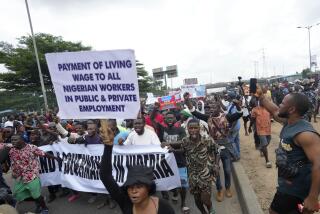Violence spreads across Egypt; at least 149 dead in Cairo crackdown
CAIRO – Deadly clashes and sectarian tensions spread across Egypt on Wednesday after security forces stormed two Cairo sit-ins, killing scores of supporters of deposed Islamist President Mohamed Morsi.
The interim government declared a state of emergency as battles between Morsi loyalists and police erupted in Cairo, Alexandria, Aswan and in smaller towns and villages. Public buildings were set ablaze and Egyptian media reported churches were attacked in a number of provinces as Islamists blamed Christians for backing the army.
The government, appointed last month after a coup overthrew Morsi and his Muslim Brotherhood movement, accused Islamists of instigating bloodshed by shooting at police. The Brotherhood said police fired live ammunition at peaceful protesters, who fled in panic down streets and alleys engulfed in tear gas and scattered with bullet casings.
The Health Ministry reported 149 people had been killed in Cairo and more than 875 injured. The Brotherhood claimed at least 300 people had died and more than 2,000 were injured. A 7 p.m. curfew was imposed in Cairo and other governorates.
“What has happened since 6 this morning till now is a massacre; no one burns an entire country just to disperse a sit-in,” said Mohammed Saeed, an accountant who quit work more than a month ago to join the pro-Morsi demonstrations.
The most intense clashes raged around the perimeter of a pro-Morsi sit-in at Rabaa al Adawiya mosque. Police unleashed tear gas and automatic weapons as security forces advanced toward the mosque and engaged protesters throwing rocks and firing slingshots and homemade weapons.
Police backed by armored personnel carriers cleared a smaller pro-Morsi protest across the Nile at Cairo University. Demonstrators from that sit-in and from other protests around the capital marched toward roads and bridges leading to Rabaa, which was engulfed in tear gas.
“We came to rescue the women and children,” said Jihan Ibrahim, an English translator who had come from home when she saw images of Rabaa on television. “They are shooting them with bullets and weapons that are only used during war and they are shooting to kill.”
Men and women banged on the sidewalks and barriers to break off stones to carry with them. One woman, dressed in a full face veil, carried a box of rocks. Some of the protesters carried vinegar-soaked tissues to stave off the sting of tear gas after security forces pushed them farther away from the mosque.
The military-backed government had threatened for weeks to disperse the camps but had several times delayed operations over fears of widespread bloodshed, including deaths of women and children. But hard-liners in the government had pressed the military and Interior Ministry to clear the sit-ins.
Millions of Egyptians had also called for a crackdown on the Brotherhood. Much of the country has rallied behind Gen. Abdel Fattah Sisi, commander of the armed forces, who led the military coup against Morsi. The new, largely secular government blamed the former president for attempting to tilt the country toward Islamic law.
“I swear by God that if you stay in your homes, Abdel Fattah Sisi will embroil this country so that it becomes Syria,” said Mohamed El-Beltagy, a Brotherhood leader, whose daughter was killed in the violence. “Abdel Fattah Sisi will push this nation to a civil war so that he escapes the gallows.”
ALSO:
18 feared trapped aboard sunken India submarine
Kerry, on visit to Brazil, gets earful over NSA spying
Mexico to seek reversal of ruling that freed DEA agent’s killer
Twitter: @JeffreyLAT
More to Read
Sign up for Essential California
The most important California stories and recommendations in your inbox every morning.
You may occasionally receive promotional content from the Los Angeles Times.












